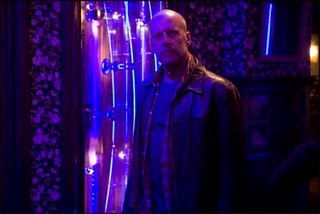Occasionally, my wife and I will see random movies back-to-back. Last night, we were supposed to see the remake of Fame, followed by the Bruce Willis Barbies-gone-bad thriller, Surrogates. A couple hours before the first movie, my brother called; he’d just returned from Fame with a scathing assessment, so we scratched it from our agenda.
Later, at Surrogates’ three-quarter mark, I leaned over to my wife and whispered, “I think we’d’ve been better off with Fame.” She nodded, and we both went back to frowning.
I’ve written exhaustively about how frustrating it is to sit through so many movies that have decent-to-fantastic premises and lousy execution. Surrogates follows in that tired, lame tradition. In the movie, Bruce Willis plays an FBI agent in a future where most of the population has succumbed to “surrogacy”, a system in which people are plugged into a chair at home while android versions of themselves wander about the outside world. The story opens with Greer investigating the killing of two “surries”—normally a mundane occurrence, this time the human counterparts perished with their robot avatars. If you’ve seen I, Robot or Gamer, you probably figured out the entire plot trajectory by the time you hit the word “surrogacy”.
That’s not to say Surrogates is a bad movie, it’s simply a pedestrian one. The PG-13 rating reflects not only the picture’s tame violence but also its narrative sophistication. There’s nothing epic here, and the movie feels exactly like what it is: a disposable, past-the-end-of-summer romp.
Clearly, screenwriters Michael Ferris and John D. Brancato and director Jonathan Mostow were aiming for socially relevant sci-fi (“It’s like, what if everyone was plugged into The Matrix…voluntarily!”), but the warnings of rampant consumerism and virtual detachment seem dated right after the truly engaging pre-title sequence; mostly because the point of Surrogates is not revolution but recycling, as in trotting out conventional grizzled cop nonsense and hackneyed chase sequences that rely way too heavily on wire-work (it’s rare that I miss CG stuntmen, but, damn, do the leaping androids look cheesy).
On the topic of looks, I found Surrogates to be extremely uncomfortable to watch. Nearly all of the androids have bizarre glowing skin; not overtly so, but just enough so that each actor appears to have liberally applied plutonium-based orange blush. In one scene, two surrogates are on an elevator that opens onto an animated digital background, and the sloppy compositing of horrendous elements nearly made my head explode.
This film would have worked better as a television series. In fact, it feels like a two-hour pilot, minus commercials. Were the creators of Lost, or even the new series Flash Forward, given this material, I have no doubt they could have given the story the breathing room to develop the truly interesting concepts (the surrogate-free “reservations”; the hows-and-whys of robots ending racism and disease; surrogates getting high using lightning-bongs) and abandon the trite garbage (yes, Bruce Willis gets suspended from the FBI, and his boss demands his gun and his badge). As it stands, Surrogates wastes its ideas, its creators’ talents, and the audience’s time.


